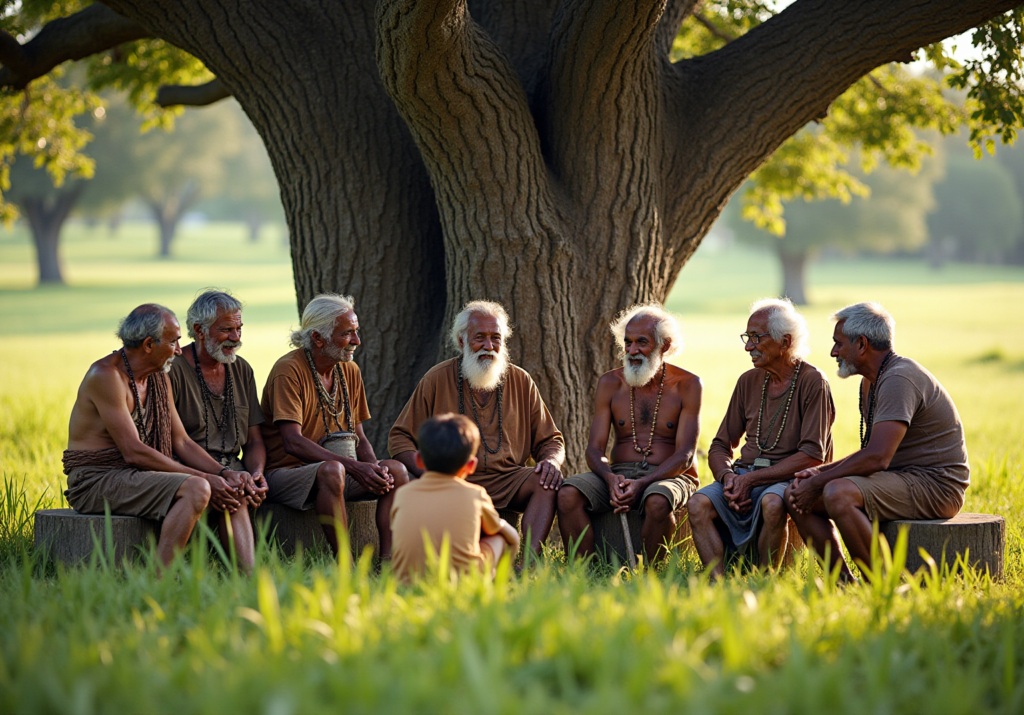Overview
The article examines the pivotal roles and challenges faced by the Council of Elders, a crucial governing body within communities. This council not only offers guidance and mediates disputes but also plays a vital role in preserving cultural values. However, it encounters significant challenges that can impede its effectiveness. These include:
- Generational gaps that create disconnects in communication
- Legal constraints that limit its authority
- Resource limitations that hinder its operations
- Resistance to change from community members
- Political interference that disrupts its functions
Addressing these challenges is essential for the council to fulfill its responsibilities effectively.
Introduction
The council of elders serves as a cornerstone of governance in numerous communities, embodying a rich tapestry of tradition and wisdom that has guided societies for centuries. As custodians of cultural values and mediators of conflict, these revered leaders play an essential role in fostering social cohesion and stability. However, as modernity encroaches upon age-old practices, the council encounters a myriad of challenges—ranging from generational divides to political interference—that threaten its effectiveness. How can the council adapt and thrive in an ever-changing landscape while remaining true to its foundational purpose?
Define the Council of Elders and Its Purpose
The council of elders functions as a crucial governing entity, made up of esteemed leaders from the community who offer vital guidance and make decisions representing their constituents. Its primary objective is to uphold cultural values, mediate disputes, and safeguard the well-being of society.
Furthermore, in numerous cultures, the council of elders serves as a custodian of customs and traditions, imparting wisdom and experience to effectively navigate contemporary challenges. This role is particularly crucial in and fostering a strong sense of identity among members, especially during periods of change or crisis.
In addition, the council’s influence can be a stabilizing force, ensuring that the community remains resilient and cohesive in the face of adversity.
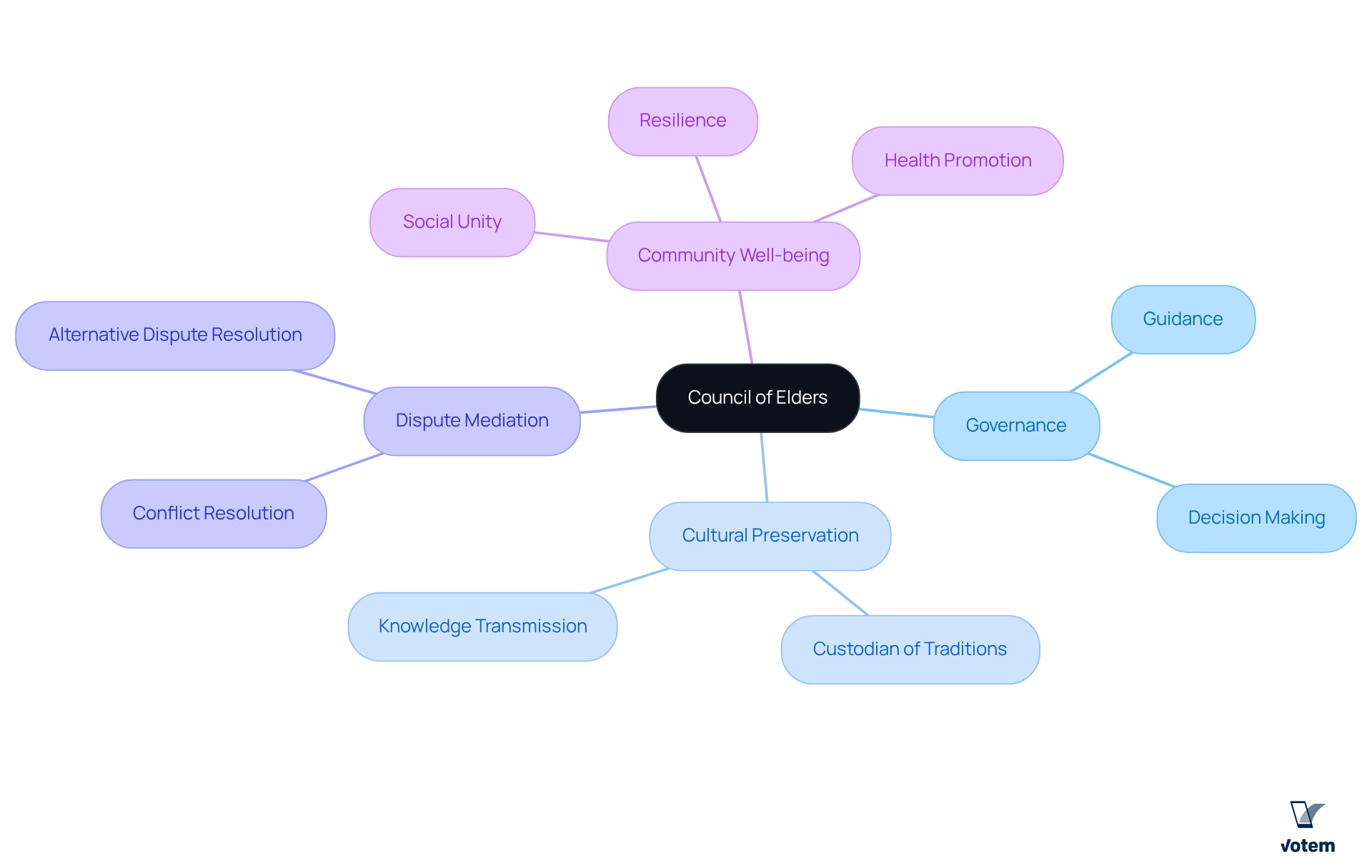
Explore the Historical Evolution of the Council of Elders
The concept of the council of elders is steeped in rich historical significance, tracing its origins back to ancient civilizations where elders were held in high regard for their wisdom and experience. Initially, these councils of elders consisted of informal gatherings of esteemed individuals who provided counsel to leaders and mediated disputes within their communities.
As societies evolved and became more structured, the role of these assemblies transformed into formal administrative bodies, often woven into the fabric of cultural traditions and legal frameworks. In many indigenous cultures, the council of elders has been instrumental in decision-making processes, influencing everything from local governance to conflict resolution.
Today, these councils continue to evolve, integrating while steadfastly upholding their traditional values. As Pope Francis poignantly remarked, “Grandparents, who have received the blessing to see their children’s children, are entrusted with a great responsibility: to transmit their life experience, their family history, and the history of a society.” This underscores the enduring significance of elders in shaping community values and leadership.
Furthermore, the historical management frameworks of ancient societies, such as the Mandate of Heaven in China, illustrate how elders were vital in maintaining order and moral legitimacy in leadership. The evolution of the council of elders within indigenous cultures exemplifies a harmonious blend of tradition and modernity, ensuring its relevance in today’s society.
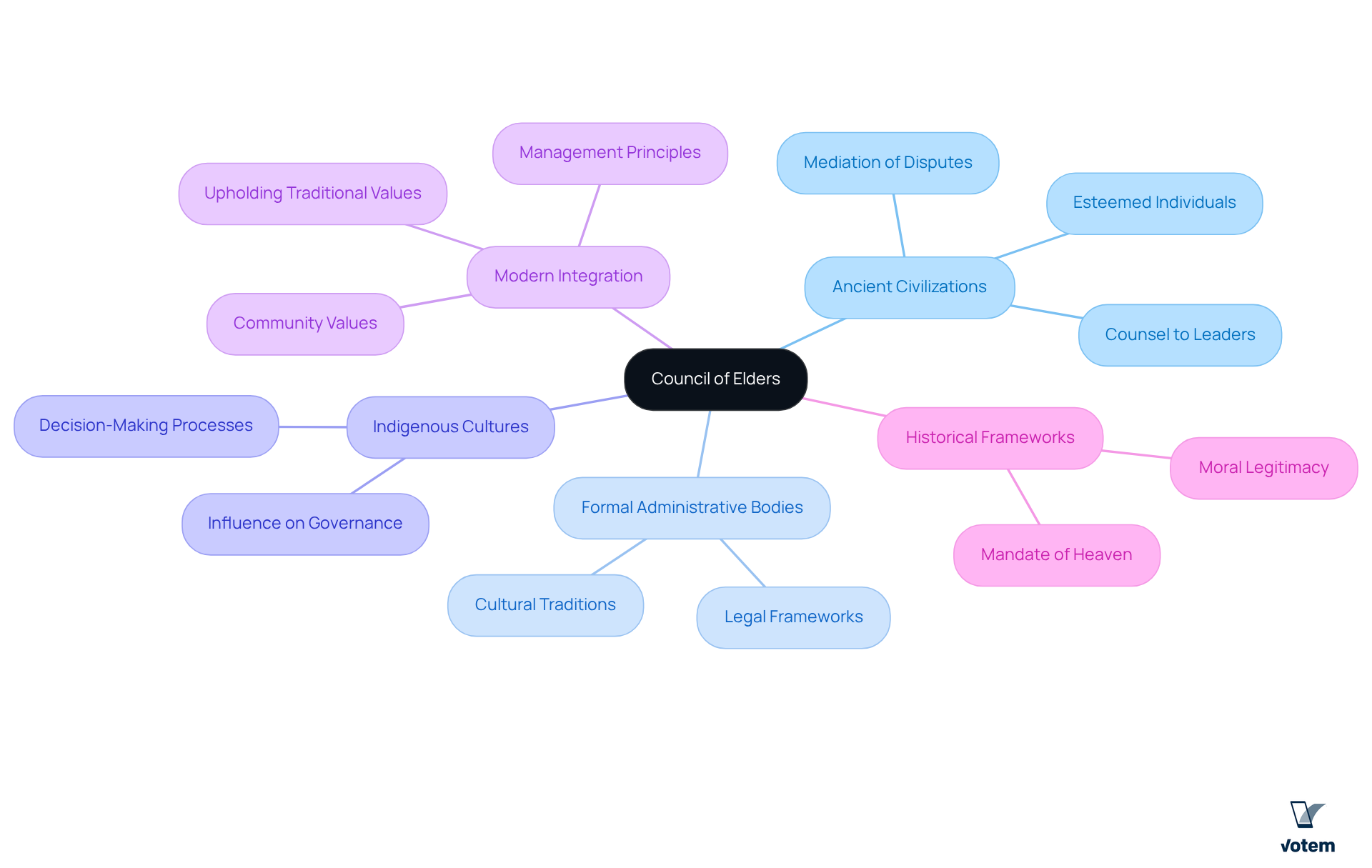
Outline the Functions and Responsibilities of the Council of Elders
The council of elders plays a vital role in community governance, encompassing several key functions and responsibilities that are essential for societal stability and cultural continuity.
- Advisory Role: The elders offer crucial advice to local leaders on important choices, ensuring that cultural values and traditions are maintained. Their insights are invaluable in guiding decisions that resonate with the community’s heritage.
- Conflict Resolution: Acting as impartial mediators, they facilitate dialogue and understanding among local members, effectively resolving disputes and maintaining harmony. Historical examples, such as the Councils of Leaders among the Agikuyu in the 19th century, illustrate their effectiveness in mediating conflicts and fostering social cohesion.
- Cultural Preservation: Elders protect traditions and customs, sharing knowledge with younger generations about their heritage. This educational role is crucial in strengthening group identity and ensuring that cultural values are transmitted effectively, thereby fostering a sense of belonging.
- Policy Development: They assist in formulating societal policies that reflect the needs and values of the population. This ensures that governance aligns with cultural expectations and promotes the community’s well-being.
- Public Involvement: By encouraging participation from local members in decision-making processes, elders foster a sense of belonging and responsibility. This involvement enhances and empowers individuals within the community.
- Judicial Oversight: In specific cultures, assemblies may supervise judicial issues, ensuring fairness and justice in local interactions. This function is vital for upholding order and trust, as demonstrated by the Agikuyu councils, which served as primary decision-making bodies.
These functions highlight the integral role of the council of elders in promoting stability, cultural continuity, and effective governance within their communities.
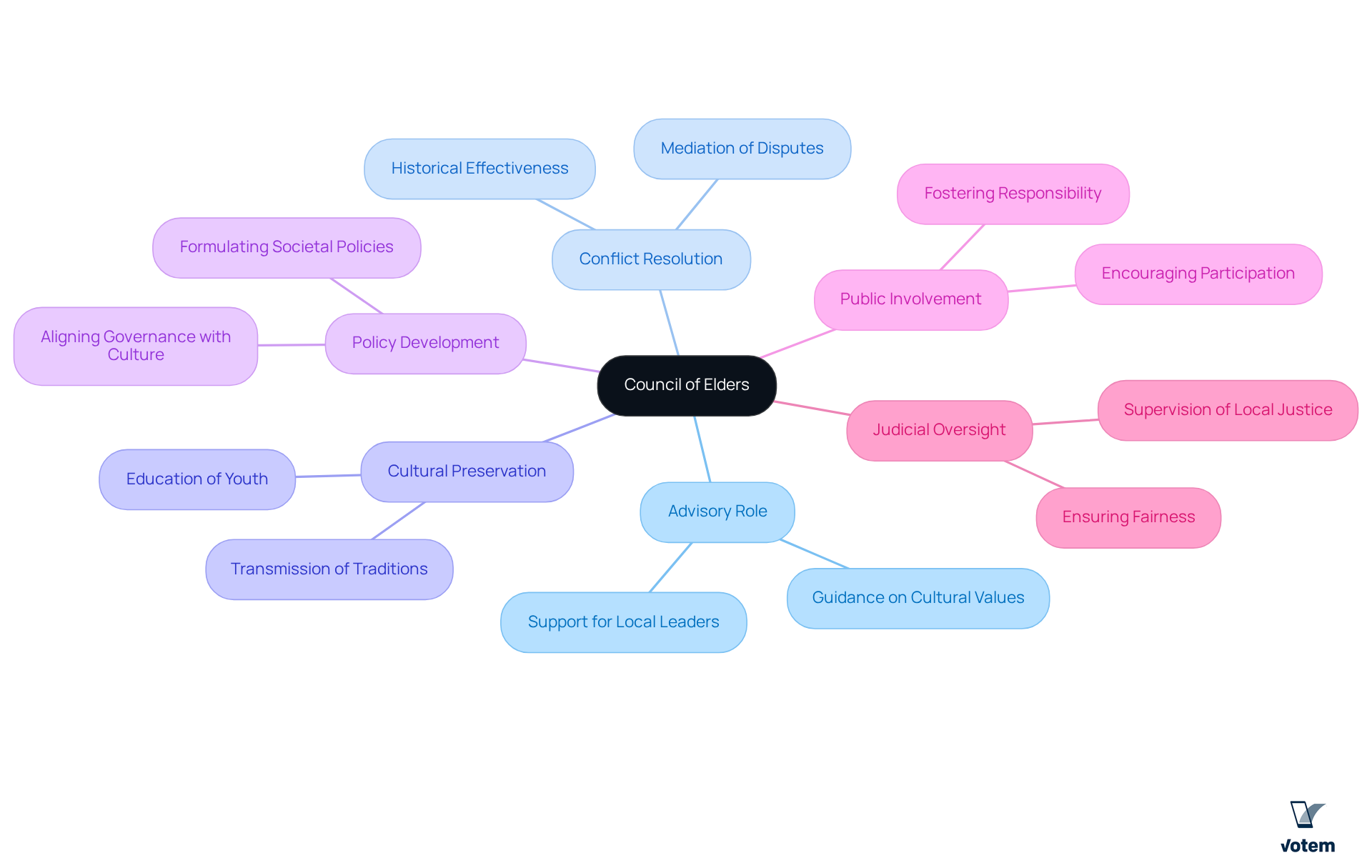
Identify Challenges in the Council of Elders’ Governance
The council of elders plays a crucial role in local governance, yet it faces significant challenges that must be addressed to enhance its effectiveness.
- Generational Gaps pose a notable issue. As younger generations increasingly embrace modern values and technologies, a disconnect arises between traditional practices and contemporary expectations. Interestingly, 41% of Gen X and millennials find working in local government appealing, suggesting that there is potential for greater engagement if their expectations are met.
- Legal Constraints further complicate matters. In various regions, legal frameworks may fail to recognize the authority of governing bodies, thereby limiting their ability to implement decisions or resolve conflicts effectively. This disconnect is underscored by the fact that 24% of baby boomers report never having had a positive experience with local government, highlighting the urgent need for authorities to adapt in order to bolster their credibility.
- Resource Limitations also hinder the capacity of local authorities. Many operate with restricted resources, which can impede their ability to engage with the public or execute initiatives efficiently. This scarcity diminishes their effectiveness and outreach, particularly in light of the negative experiences reported by older generations.
- Resistance to Change is another challenge. While local authorities are often seen as custodians of tradition, there can be significant opposition to , resulting in tensions within the community. Experts emphasize that understanding public sentiment is vital for effective engagement, underscoring the necessity for local authorities to evolve.
- Finally, Political Interference can undermine the independence of councils, affecting their credibility and effectiveness in governance. Case studies regarding baby boomers’ experiences with local government illustrate how such interference can lead to conflicts of interest and erode trust within the community.
Addressing these challenges is essential for the council of elders to fulfill their vital role in governance and community engagement.
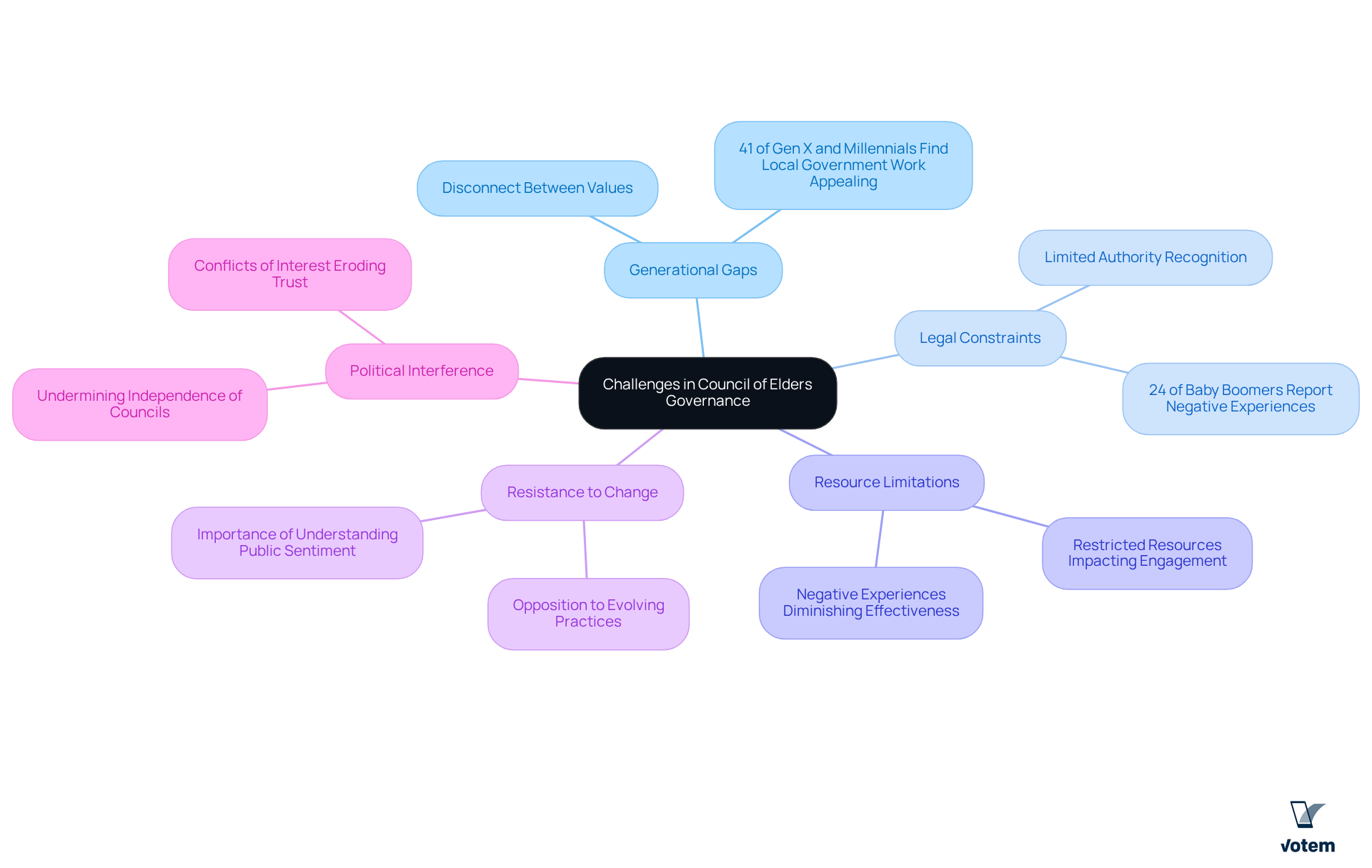
Conclusion
The council of elders serves as a pivotal institution within communities, embodying the wisdom and guidance essential for fostering cultural integrity and stability. By acting as mediators, advisors, and custodians of tradition, these councils ensure that societal values are upheld while addressing contemporary challenges. Their role extends beyond preserving the past; it encompasses adapting to the needs of the present and future.
Several key functions of the council of elders are critical to their effectiveness. These include:
- Advisory capacity
- Conflict resolution
- Cultural preservation
- Policy development
- Public involvement
- Judicial oversight
Such responsibilities underscore the essential nature of the council in promoting social cohesion and effective governance. However, it is equally important to recognize the challenges they face, including:
- Generational gaps
- Legal constraints
- Resource limitations
- Resistance to change
- Political interference
Addressing these issues is crucial for the council to maintain its relevance and effectiveness in modern governance.
Ultimately, the significance of the council of elders transcends mere tradition; it represents a vital link between the past and the future. As societies evolve, embracing the wisdom of elders while navigating contemporary dynamics will be essential for fostering resilient communities. Engaging younger generations and adapting to new realities will empower councils to fulfill their roles more effectively, ensuring that the rich heritage of cultural values remains a guiding force in governance.
Frequently Asked Questions
What is the Council of Elders?
The Council of Elders is a governing entity comprised of esteemed leaders from the community who provide guidance and make decisions on behalf of their constituents.
What is the primary purpose of the Council of Elders?
The primary purpose of the Council of Elders is to uphold cultural values, mediate disputes, and safeguard the well-being of society.
How does the Council of Elders contribute to cultural preservation?
The Council of Elders acts as a custodian of customs and traditions, sharing wisdom and experience to help navigate contemporary challenges and preserve social unity.
Why is the role of the Council of Elders important during times of change or crisis?
The role of the Council of Elders is important during times of change or crisis as it fosters a strong sense of identity among community members and serves as a stabilizing force to maintain resilience and cohesion.
What impact does the Council of Elders have on community well-being?
The Council of Elders has a significant impact on community well-being by ensuring that cultural values are upheld and by mediating disputes, which contributes to a harmonious society.
List of Sources
- Define the Council of Elders and Its Purpose
- Fostering National Unity through Council of Elders in Kenya – Page 3 – KIPPRA (https://kippra.or.ke/fostering-national-unity-through-council-of-elders-in-kenya/3)
- Importance of Indigenous elders’ contributions to individual and community wellness: results from a scoping review on social participation and intergenerational solidarity – PMC (https://pmc.ncbi.nlm.nih.gov/articles/PMC7501322)
- Explore the Historical Evolution of the Council of Elders
- Gautama Buddha Quotes About Elders | A-Z Quotes (https://azquotes.com/author/37842-Gautama_Buddha/tag/elders)
- Top Pope Francis’ Quotes on the Elderly – Universe of Faith (https://universeoffaith.org/top-pope-francis-quotes-on-the-elderly)
- Ancient Governance: How Early Civilizations Managed Nations and Shaped History (https://medium.com/@yamadakuro2k4/ancient-governance-how-early-civilizations-managed-nations-and-shaped-history-d5b12c0f8f02)
- The Council of Elders of the Organization of Turkic States convened in Ashgabat (https://turkicstates.org/en/news/the-council-of-elders-of-the-organization-of-turkic-states-convened-in-ashgabat)
- Outline the Functions and Responsibilities of the Council of Elders
- The Miwon Prize gives fresh impetus, validation and responsibility to The Elders’ mission (https://theelders.org/news/miwon-prize-gives-fresh-impetus-validation-and-responsibility-elders-mission)
- Fostering National Unity through Council of Elders in Kenya – KIPPRA (https://kippra.or.ke/fostering-national-unity-through-council-of-elders-in-kenya)
- Solved: State the functions of Councils of elders amona the Agikuyu in the 19^(th) Century. [Others] (https://gauthmath.com/solution/1808918230218758/4-State-the-functions-of-Councils-of-elders-amona-the-Agikuyu-in-the-19th-Centur)
- Identify Challenges in the Council of Elders’ Governance
- Understanding Generational Differences Can Improve Local Gov Services – GovLoop (https://govloop.com/community/blog/understanding-generational-differences-can-improve-local-gov-services)

